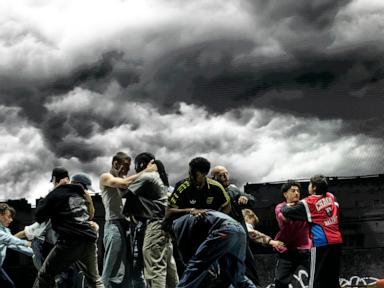One of the first places Timothy Griffith Jr. went after the deadliest wildfire in more than a century ripped through Maui's west coast was . The chief arborist for Maui county had seen and social media posts that made him fear the worst.
Griffith imagined the 151-year-old giant had been reduced to a pile of ash. So when he arrived the day after the blaze, he was surprised to see still standing, though its leaves were curled and brown. Underneath the bark near the base of its trunks, there was living tissue, a hopeful sign, but on the major branches, all the leaves and twigs were scorched.

The tree was in a coma. Griffith . Through painstaking pruning and care, watering and nursing during the past year, Griffith and a team of arborists, volunteers and experts have helped it grow anew, coaxing fresh leaves that are now nearly seven feet long, an encouraging sign that like Lahaina itself, the iconic banyan will not only survive but thrive.
“It really is a phoenix from the ashes, and it just gives people hope,” Griffith told USA TODAY. This is the story of how Maui residents saved the with all its glory but also complicated history, and helped heal themselves in the process. Its branches have witnessed love and loss, weddings and funerals – life with all its highs and lows, took place beneath its canopy and, for hundreds of mynah birds, within it.
Tad Craig, a photographer who has lived on Maui for 30 years, fondly remembers browsing the market held beneath the tree's branches every Saturday. He shot photos of newlyweds cradled in its trunks – the last of a couple after their ceremony at Maria Lanakila Church just two months before the disaster. "It was just a beautiful, beautiful tree," Craig reflected, noting that he gathered with his loved ones after his own wedding in 2019 for photos beneath the banyan.
The wildfire on Aug. 8, 2023 raged through quaint Lahaina town, the , leveling nearly every structure, including historic landmarks like the beloved . More than 100 people died, some trapped in their cars as they tried to flee .
The flames roared right over the tree, rooted in the heart of town, at the ocean's edge. Helping to nurse what was left of the banyan fed Duane Sparkman's soul in the aftermath, as for food, fuel and other essential supplies. He was one of more than 50 volunteers who joined Griffith in trying to keep the banyan alive.
Sparkman, chief engineer at the Royal Lahaina Resort & Bungalows, often hung lights on the tree as chairman of the Maui County Arborist Committee during times of celebration before the fire. "I spent a lot of time with the tree, just in the shade, enjoying the size of it, the mass of it, and living in awe of a tree of that size," he said. "And so to be able, or to have the – responsibility – to oversee the regrowth, it's very heartwarming to me that I was even allowed to.
" The day after the fire, as embers smoldered and the work began. Water tankers were brought in to douse the browning canopy and soak the roots. Workers injected compost tea into the soil to infuse it with micronutrients and scattered crushed alfalfa on the surface to provide extra nitrogen.
About six weeks after the fire, , but Griffith knew the road to recovery would be long. The image of the banyan still standing after the fire that had taken so much from so many quickly became a logo of hope for "Lahaina Strong," splashed across t-shirts and tote bags. But the tree has a more complicated meaning to indigenous Hawaiians.
Ekolu Lindsey, president of Maui Cultural Lands, which is dedicated to preserving Hawaiian culture, archeological sites, native plants and people, said that to many, the is not a revered icon because it was planted to honor the arrival of Protestants. The banyan was imported from India at the request of Queen Keopuolani to honor the 50th anniversary of the arrival of the first Protestant missionaries in the area. Planted as a sapling in 1873, the tree grew to a height of 60 feet, spanned 1.
94 acres in length and shaded nearly two-thirds of an acre, . "Most of the local people don't identify with it, but since the world is grabbing at it, I think we need to utilize that as a catalyst to look at other things," Lindsey said. Like the banyan tree, his family has been in Lahaina since the 1800s, and they were among the last local families living on Front Street before their oceanfront home was destroyed by the flames.
He said they lost a number of trees in the fire as well, including a 150-year-old breadfruit or tree, a large sea grape tree, coconut trees and "the best mango tree around." Like many others, Lindsey said he hopes to return home within the next six months "even if I have to pitch a tent or roll a trailer in or something." He's looking forward to replanting the ulu tree.
"We have generational memories in those spaces, the smell of seaweed, the smell of the fish your grandfather would catch, the smell of the mangos as they fall, all those memories," Lindsey said. "To go back now, over this past year after the fires I have seen a major rebound." Griffith, the county arborist, believes two large monkey pod trees, which were burnt to a crisp, shielded the banyan tree from worse damage.
But the northeast corner of the tree, which was next to a two story building, had burned the hottest and never showed signs of new growth. As limbs started to fall to the ground, before any more structural damage befell the rest of the tree. The banyan tree is watered about three days a week and sensors monitor its water uptake.
Griffith visits once a week to check on new leaves and poke around in the soil for new root growth. “It's not out of the woods,” Griffith said. “But the fact that it continues to put out new growth, we remain optimistic – cautiously optimistic – that we will have something to work with in the decades to come.
” The team has taken a couple dozen cuttings from the new growth and gotten them to root in pots. They plan to replant the offspring, also called keiki, in the northeast corner in the years to come and coax them to grow toward the parent tree over the next few decades. “It'll never look the same again, but it's there and we'll have something to work with,” Griffith said.
Griffith said the fire killed an estimated 25,000 trees, including historic ulu trees brought by canoe from Polynesia, and his team hopes to replant their offspring, too. “So many people are volunteering their time,” he said. “I get all sorts of emails.
I had one from last week, people just wanting to donate cuttings or little trees.” Now, though, it's too soon to think about replanting. Even as the one-year anniversary of the deadly fire approaches, officials are still working to remove debris from the burn zone.
The dark memories of the fire still haunt Sparkman. He said fireworks remind him of the propane tanks and cars he heard explode that night. But he's been impressed to see the budding reconstruction in the burn zone.
Parts of Lahaina are still closed to outsiders, including the area around the tree, but some restaurants, businesses and other areas are open, and support Maui's recovery. Craig said the last two months have been the best his photography business has had since the fire, though he's still anxious about the future. Driving past Lahaina still brings tears to his eyes, but he's "elated" the tree is still standing, "remarkable and resilient.
" "It's a symbol of hope for Hawaii and hope for Lahaina," he said. After the fire, Sparkman raised more than $220,000 and purchased about 3,500 young trees to help replant the island's urban forest through his nonprofit called Treecovery. The organization is giving them out for free to families impacted by the fires.
"Trees are a big thing out here in Hawaii, it becomes part of a family," he said. "We really, desperately need them." While the trees wait for new homes, they are being cared for in a dozen hubs around the island, including private residences and resorts with the help of both locals and tourists, he said.
"By helping they're healing," Sparkman said. "This is a big, giant healing process for all of us.".



















